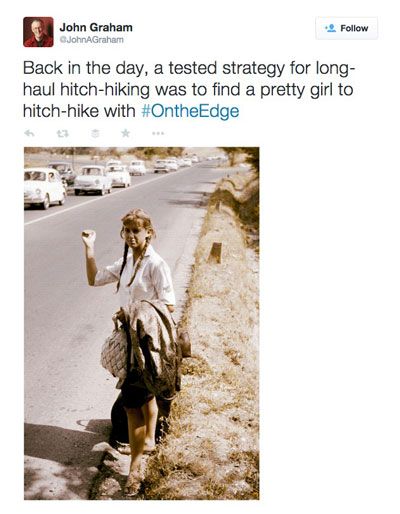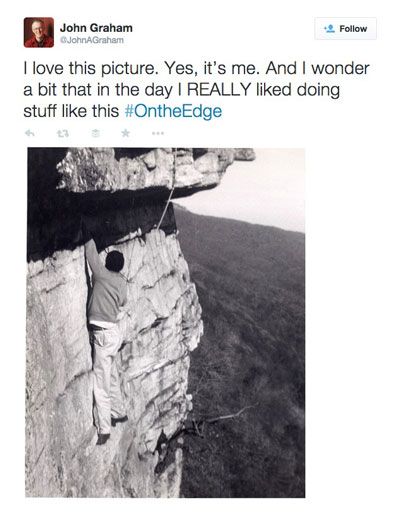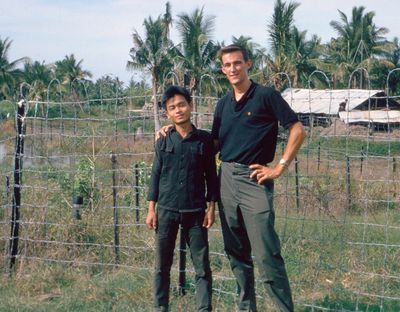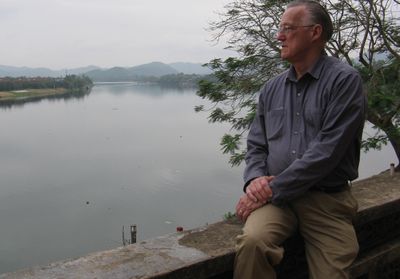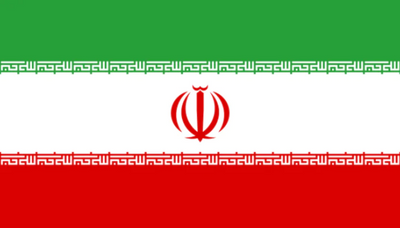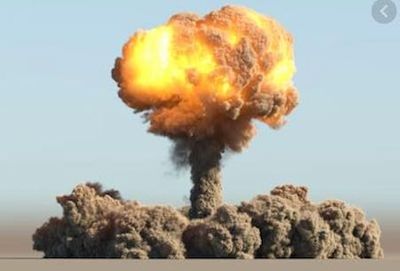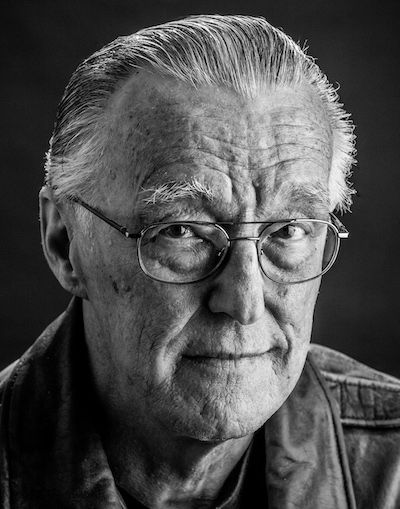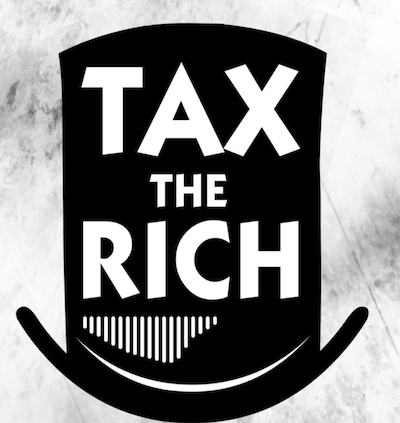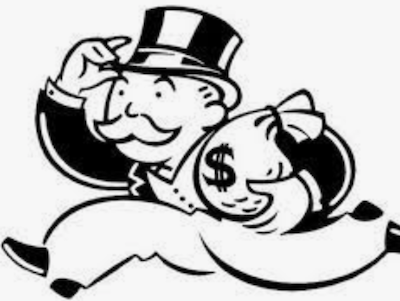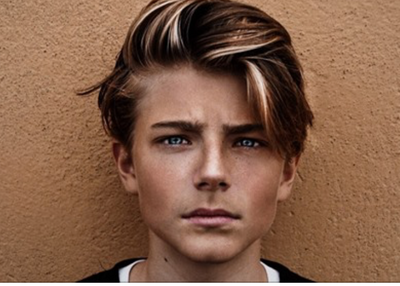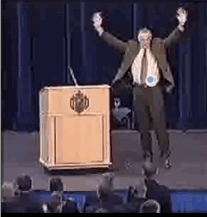
John Graham Speaks at the Naval Academy
At Annapolis all 4,500 midshipmen roared to their feet in response to my speech, challenging them to think deeply about "War, Leadership and a Moral Life." For more on my speeches and workshops, go here.
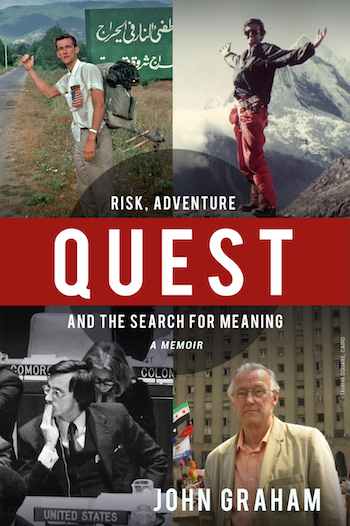
QUEST — Risk, Adventure and the Search for Meaning
WATCH THIS 90-SECOND PEEK at avalanches, wars, and a lifeboat in a typhoon, to the greatest adventure of all—finding your way to a meaningful life. I wrote it all down so you don’t have to dodge bullets or even get wet to take this journey. You can pre-order QUEST now, from your favorite bookseller or from Amazon.
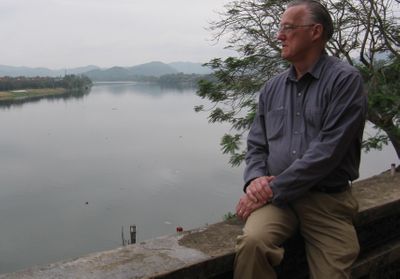
Vietnam Revisited
In 1972, I was US Advisor to the City of Hué, South Vietnam. Some evenings, especially if the day had been difficult and dangerous, I would drive a few miles outside the City to an ancient pagoda called Linh Mu. There I would sit at this very spot on a wall overlooking the Perfume River where I would try to absorb some of the calmness of the river, the temple bells, and the monks sweeping the courtyard with straw brooms. But the war was never very far away. more
Shots from the album. Ah youth!
SELECTED BLOG POSTS
Please Joe (and Jill) Get Real
John Graham
By now you’ve read opinions and analyses of Joe Biden’s debate performance. I add my views from the perspective of being almost exactly Biden’s age and having been a competent platform speaker for half a century.
Of this there’s no doubt: Biden tanked. He looked and sounded frail and uncertain. Where he should have countered Trump’s blasts of lies and invective with a clever mix of humor, anger and facts, he mumbled statistics. There was an appalling lack of energy and conviction in his voice. The debate was not a debate; it was a Sound and Light show in which style, posture, and tone were far more important than facts, and Biden either did not understand that or could not cope with it.
We’re now told that he had a bad cold. What BS! We’ve all had to play hurt from time to time. In perhaps the most important presentation of his life, Biden should’ve popped an Advil, sucked it up, and soldiered on. Laryngitis? Well, the next day he sounded just fine.
Poor debate prep? He and his staff had weeks to prepare. They knew Trump would direct a firehose of lies and insults at Biden with the hope of throwing him on the defensive and undermining his responses. As expected, Trump’s lies were so obvious that most of them should’ve been home run balls that Biden could knock out of the park with a mix of facts and nasty jabs, wrapped in Biden’s inimitable humor.
moreIf There's a Hell, Henry Kissinger is in It
John Gaham
There’s no doubt that Henry Kissinger was a complicated man, as shown by the torrent of fierce opinions published since his death.
I worked for the man and Vietnam was where I first began to hate him. A young US diplomat, I was a civilian adviser to the Mayor of Hué, one of the most dangerous places in the country during the last years of the war, at a time when any American there still in control of his senses knew we’d lost the war.
Kissinger and Nixon knew this too, and had begun to rapidly withdraw US troops soon after I arrived there in January, 1971. But the two men also knew they could not admit defeat. Both were concerned about America’s image—Nixon mindful of his own political fortunes and Kissinger more concerned that America’s global rivals would see a US defeat in Vietnam as proof of America’s weakness.
So the two launched a strategy called “Vietnamization” to promote the fiction that the South Vietnam could win the war without American boots on the ground. It was never more than a PR ploy to divert attention from the fact that the US has just gotten its butt kicked by a small, poor nation few Americans had even heard of when we began fighting there.
moreA Personal Battle in Vietnam
John Graham
As you may know, Gordon Lightfoot recently died. You may have memories of the Canadian singer/songwriter’s work. My memory is that he changed my life.
In 1971-72, as a US Foreign Service Officer, I was Advisor to the city of Hué, South Vietnam. I’d volunteered for Vietnam because being in a shooting war was one adventure I’d not yet had.
I was an adrenaline addict, drawn to war zones and high, dangerous mountains. I’d asked the State Department for the most dangerous job they had in Vietnam and they had definitely obliged. Hué, the site of the infamous Tet Offensive of 1968, was just south of the Demilitarized Zone between the two Vietnams and a constant target for North Vietnamese troops and Viet Cong guerillas. Some of my work involved dealing with Viet Cong undercover agents in the city. I was an easy target for snipers and car bombs. At first I loved it—the hair rising on the back of my neck, the shadows in the night… It was all fuel for a self-absorbed and shallow life.
But my most significant battle in Vietnam was an inner one. The war became more than just the source of the next biggest thrill—a killing field where my actions endangered more lives than my own, in a war which I soon came to regard as stupid and unwinnable. I was in Vietnam as a mercenary, paid in adrenaline instead of gold.
moreA Near-Miss That Almost Changed History
John Graham
The Iran Hostage Crisis Re-visited
In November of 1979 the staff of the US Embassy in Teheran was taken prisoner by mobs controlled by the Ayatollah Khomeini. Two months of diplomatic pressures and direct threats hadn’t freed them.
But in early 1980, I came close.
I thought I knew then why I’d failed, but I didn’t know the half of it. Decades of investigative reports have now revealed the truth. Any efforts to free those hostages before the U.S. Presidential election that next November would have been undermined by powerful operatives in Ronald Reagan’s election campaign who saw that keeping the hostage crisis on the front burner would be a fatal blow to the chances of Jimmy Carter winning a second term.
I was at the time an American diplomat at the US Mission to the United Nations in New York. I’d been ordered not to talk to members of the Cuban delegation, our sworn enemies since Castro’s Communist takeover there. I thought that was stupid, so I talked often with the Castro Cubans, usually in bars well off the UN campus. They were baseball nuts as was I, so baseball became a vehicle for establishing respect and friendships with these people on the US hate list. It also led to an exchange that could have freed the American hostages in Tehran a year before they were finally released. Here's the section of my memoir, Quest, that gives you that story:
moreTo Leak or Not to Leak?
John Graham
The recent security breach by a young idiot video-gamer out to impress his friends was worse than you think. It could end up being one of the worst security breaches in the history of US intelligence operations.
It should never have happened. It’s crazy that anybody in the US government would consider giving a top-secret clearance to a naïve, unqualified kid in the National Guard. The real damage has yet to be fully known, but it’s already clear that US intelligence services are the laughingstock of their counterparts around the planet, friend and foe. As well they should be.
In the 70s, in the middle of the Cold War, as a US Foreign Service Officer, I was a member of NATO’s top secret Nuclear Planning Group (NPG), charged with planning how a nuclear war might be waged—and “won”—in Europe. It was a very prestigious job and a steppingstone to higher rank. I was given a Top-Secret Umbra clearance—plus a clearance above that that allowed me to spend a week at a secret facility in New Mexico learning about specific nuclear weapon designs. The idea was to learn how to target the right weapon to the right target (maximize blast in order to knock down buildings; maximize radiation to kill people).
moreCould Putin’s Invasion Go Nuclear? A Former NATO War Planner Assesses the Odds
Will a nuclear war start in Ukraine? Is that even possible? Maybe we’re just watching a Netflix re-run of Dr. Strangelove.
No. It’s possible. As someone who once planned nuclear war for NATO, I can tell you that events in Ukraine have moved us closer to Armageddon than anything since the Cuban Missile Crisis.
Putin said two weeks ago that he’d placed Russian nuclear forces in “a high state of readiness,” but NATO intelligence has picked up no sign as yet of the actual movement of warheads and launch vehicles out of locations where they are stored. That’s a good thing.
But the possibility of nuclear war is still what motivates NATO’s refusal to create a “no-fly zone” over Ukraine, a move that would carry the risk of widening the war beyond Ukraine, up to and including a nuclear response from an irrational and unpredictable Russian leader.
Here’s how I’d assess the current odds on a nuclear war starting in Ukraine:
First, the stakes in this war get higher with every public comment made by the leaders of NATO, Russia and Ukraine, ratcheting up tensions and providing incentives for increasingly risky behavior.
Putin has made it plain he sees the war in Ukraine as an existential crisis where a Russian defeat would threaten the very existence of the Russian state. He sees Ukraine as an integral part of Russia, intertwined by over 1,000 years of history, ethnicity, geography, and culture. Putin has fumed for two decades over NATO’s eastward expansion following the collapse of the Soviet Union. Now he sees expansion of NATO into Ukraine as a dagger pointed at Russia’s heart.
moreWhat’s So Great about Being White?
375 people have now been arrested, charged and intensively interviewed about their participation in the attack on the US Capitol January 6. A reliable picture is emerging of who they are and what motivated them.
It’s no surprise that they were overwhelmingly white and male and strongly influenced by Donald Trump’s campaign to overturn the November election
But it came as a bit of a surprise, at least to some, that only about 10% were members of known far right groups like the Proud Boys. And that the attackers as a whole we’re not under-educated know-nothings, as assumed by the initial media coverage, but in fact socially, educationally, and economically middle class.
The one unifying motivation, in both the white-collar and blue-collar rioters, was their fury at seeing white people in this country displaced by people of color in so many sectors of daily life.
It’s a change they perceive as leaving whites a threatened and beleaguered minority.
According to the interviews, it was this anger and fear of replacement, across social classes, and more than any other factor, that drove them to attack the government they’d been pledging allegiance to since they were children.
moreTax the Rich! It’s Time
In the summer of 1964, on a year-long global journey by bus and hitchhiking, I found myself in the middle of one of the worst famines in history. I was on the Ethiopian plateau, 10,000 feet above sea level, and it would be the most godforsaken place I would ever see. Hidden from the world in this barely accessible place,peasants wrapped in rags or even old newspapers huddled in the bone-numbing rain and cold. At everystop, crowds of them surrounded the bus to beg. Many of them were lepers or blind. Many were children withdistended bellies and death stares.
Decades later I can still see the vacant eyes of those starving people and still remember the anger and confusion I felt that nobody seemed to give a damn about these tens of thousands of people dying. 300 miles south, the corrupt dictator who ruled the country and his cronies lived in luxury. And wealthy countries in Europe, and the United States, seemed not to even notice. I wrote articles for the Boston Globe about what I saw but none of them did any good. Those people died and I felt complicit because I could do nothing to stop it.
But the experience changed me even if it didn’t save lives. Of course I knew that there would always be rich and poor. But since that experience in Ethiopia I’ve never been able to accept the continuing indifference of the rich to the sheer level of misery caused by poverty, disease and violence—scourges that wealthy people and governments could greatly ease but don’t.
moreHow the Rich/Poor Divide is Tearing This Country Apart
A few days ago, my daughter and I carried out her wild idea of re-creating the Last Dinner on the Titanic. It was a daft way of celebrating our own rescue from another sinking passenger ship exactly 41 years ago.
She made cocktails, an elaborate appetizer, and an extravagant dessert. I did salad and meat, both of us following the recipes used on the Titanic. We had to assemble truffles, paté de foie gras, filet mignons, shrimp, saffron, asparagus, artichoke hearts, plus vast quantities of eggs, cream, butter and of booze—champagne, Chartreuse, Madeira, red wine, and cognac.
Hours of work later, we had four of the eleven courses that were served to the first-class passengers on that fateful night that some of them did not survive.
The meal was the epitome of conspicuous consumption, of wealth-flaunting, and of calories-be-damned, full speed ahead. It’s a wonder they didn’t die in the dining room, before the ship hit the iceberg.
Below decks, in steerage, the menu included gruel and boiled potatoes. Gruel. On the menu. And so little room in the lifeboats that three quarters of the steerage passengers drowned.
That whole cooking experience had me looking at the chasm between the rich and everybody else in the US now and seeing a match to that earlier era’s excesses of the wealthy, and its disregard for people who weren’t rich enough to be up there in that posh dining room, eating truffles.
moreHow to Be a Man
John Graham
Take a step behind the discussions on guns, misogyny, and the anger and loneliness that are driving men’s addictions and suicides. Time after time, in that dark place, I see men struggling to communicate or even acknowledge their emotions, men wanting but failing to form positive relationships with other men, men whose fathers were emotionally AWOL, men who grew up without good role models for what it means to be a brave, caring and responsible male human being.
I’m a 75-year-old white, straight male and my views reflect my experience. I cannot speak for my black, brown, gay and trans brothers. Some of them may face the issues I raise here, but that is for them to say.
As a skinny little boy my chosen role models were all Rambos. My anger at the bullies who tormented me was incandescent. My father was kind but emotionally absent. My definition of manhood for years centered on risk and violence, both of which I became quite good at handling, as a mountain climber and as a Foreign Service Officer. I would love to tell you that I’ve long since grown past all that but the people who know me well would tell you I’m not quite there yet.
I think a lot of other men in America are “not quite there yet” because straight white men, still at the top of the conventional power pyramid, have never had to seriously examine the often toxic pathologies so many of us grew up with.
moreSign up for my blog
My blog pieces are hopefully competent, provocative words on a hot button issue to which I invite you to respond.. Privacy rules: I protect your data and will never sell or lend subscribers’ addresses to anyone. Ever.








